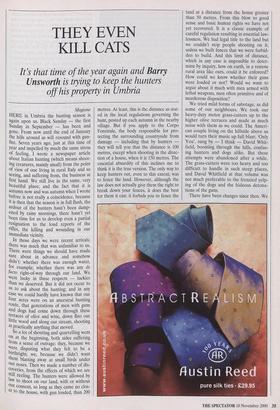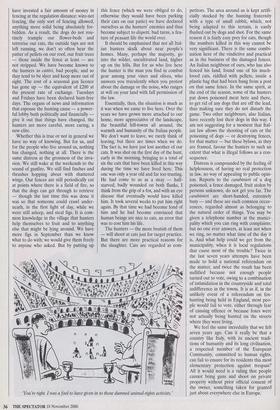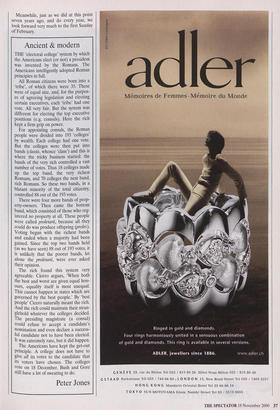THEY EVEN KILL CATS
It's that time of the year again and Barry Unsworth is trying to keep the hunters
off his property in Umbria
Magione HERE in Umbria the hunting season is again upon us. Black Sunday — the first Sunday in September — has been and gone. From now until the end of January the hills around us will resound with gun- fire. Seven years ago, just at this time of year and impelled by much the same stress of feeling, I wrote a newspaper article about Italian hunting (which means shoot- ing creatures, mainly small) from the point of view of one living in rural Italy and so seeing, and suffering from, the business at first hand. We still live in the same, very beautiful place; and the fact that it is autumn now and was autumn when I wrote before is not really a coincidence, because it is then that the season is in full flush, the ardour of the hunters hasn't been damp- ened by rainy mornings, there hasn't yet been time for us to develop even a partial resignation to the loud reports of the rifles, the killing and wounding in our immediate vicinity.
In those days we were recent arrivals; there was much that was unfamiliar to us. There were things we should have made sure about in advance and somehow didn't: whether there was enough water, for example; whether there was any de facto right-of-way through our land. We were lucky in these respects — luckier than we deserved. But it did not occur to us to ask about the hunting; and in any case we could hardly have known that our four acres were on an ancestral hunting route, that generations of men with guns and dogs had come down through these terraces of olive and wine, down into our little wood and along our stream, shooting at practically anything that moved. So a lot of shouting and quarrelling went On at the beginning, both sides suffering from a sense of outrage: they, because we were disputing what they felt to be a birthright; we, because we didn't want them blasting away at small birds under our noses. Then we made a number of dis- coveries, from the effects of which we are still reeling. The hunters were allowed by law to shoot on our land, with or without our consent, so long as they came no clos- er to the house, with gun loaded, than 200 metres. At least, this is the distance as stat- ed in the local regulations governing the hunt, posted up each autumn in the nearby village. But if you apply to the Corpo Forestale, the body responsible for pro- tecting the surrounding countryside from damage — including that by hunters they will tell you that the distance is 100 metres, except when shooting in the direc- tion of a house, when it is 150 metres. The essential absurdity of this inclines me to think it is the true version. The only way to keep hunters out, even to this extent, was to fence the land. However, although the law does not actually give them the right to break down your fences, it does the best for them it can: it forbids you to fence the land at a distance from the house greater than 50 metres. From this blow to good sense and basic human rights we have not yet recovered. It is a classic example of careful regulation resulting in essential law- lessness. We had legal title to the land but we couldn't stop people shooting on it, unless we built fences that we were forbid- den to build. And this limit of distance, which in any case is impossible to deter- mine by inquiry, how on earth, in a remote rural area like ours, could it be enforced? How could we know whether their guns were loaded or not? Would we want to argue about it much with men armed with lethal weapons, men often primitive and of murderous disposition?
We tried mild forms of sabotage, as did some of our neighbours. We took our heavy-duty motor grass-cutters up to the higher olive terraces and made as much noise with them as we could. The Ameri- can couple living on the hillside above us would turn their music up full blast; 'Only You', sung by — I think — David Whit- field, booming through the hills, confus- ing hunters and dogs alike. But these attempts were abandoned after a while. The grass-cutters were too heavy and too difficult to handle in such steep places, and David Whitfield at that volume was not much preferable to the frenzied yelp- ing of the dogs and the hideous detona- tions of the guns.
There have been changes since then. We have invested a fair amount of money in fencing at the regulation distance: wire-net fencing, the only sort of fencing allowed, anything more solid being absolutely for- bidden. As a result, the dogs do not rou- tinely trample our flower-beds and terrorise our cats, the outside taps are not left running, we don't so often hear the patter of pellets on our roof, our fruit trees — those inside the fence at least — are not stripped. We have become known to the hunters as cattivi, bad people, and so they tend to be slyer and keep more out of sight. The cost of a seasonal gun licence has gone up — the equivalent of £200 at the present rate of exchange. Tuesdays and Fridays have been declared hunt-free days. The organs of news and information that espouse the hunting cause — a power- ful lobby both politically and financially give it out that things have changed, the hunters are more careful, more caring, a new elite.
Whether this is true or not in general we have no way of knowing. But for us, and for the people who live around us, nothing has changed, nothing at all. There is the same distress at the grossness of the inva- sion. We still wake at the weekends to the sound of gunfire. We still find finches and thrushes hopping about with shattered wings. Our fences are still periodically cut at points where there is a field of fire, so that the dogs can get through to retrieve — though the last time this was done it was so that someone could crawl under- neath, in the first light of day, while we were still asleep, and steal figs. It is com- mon knowledge in the village that hunters help themselves to fruit and to anything else that might be lying around. We have more figs in September than we know what to do with; we would give them freely to anyone who asked. But by putting up this fence (which we were obliged to do, otherwise they would have been parking their cars on our patio) we have declared ourselves as the hunters' enemies and thus become subject to dispetti, bad turns, a fea- ture of peasant life the world over.
It should be emphasised that not all Ital- ian hunters skulk about near people's homes. Many, perhaps the majority, go into the wilder, uncultivated land, higher up on the hills. But for us who live here the hunter is the man you find in combat gear among your vines and olives, who answers you truculently when you protest about the damage or the noise, who ranges at will on your land with full permission of the law.
Essentially, then, the situation is much as it was when we came to live here. Over the years we have grown more attached to our home, more appreciative of the landscape, the beautiful hill-towns all around, the warmth and humanity of the Italian people. We don't want to leave, we rarely think of leaving, but there are times when we do. The fact is, we have just lost another of our cats. It was shot on the first day of the hunt, early in the morning, bringing to a total of six the cats that have been killed in this way during the time we have lived here. This one was only a year old and far too trusting. He had come to us as a stray — half- starved, badly wounded on both flanks, I think from the grip of a fox, and with an eye disease that eventually would have killed him. It took several weeks to put him right again. By that time we had become fond of him and he had become convinced that human beings are nice to cats, an error that was to cost him his life.
The hunters — the more brutish of them — will shoot at cats just for target practice. But there are more practical reasons for the slaughter. Cats are regarded as com- `You're right. I was a fool to have given in to those damned animal-rights activists.' petitors. The area around us is kept artifi- cially stocked by the hunting fraternity with a type of small rabbit, which, not being adapted to this terrain, is easily flushed out by dogs and shot. For the same reason it is fairly easy prey for cats, though the numbers killed in this way cannot be very significant. There is the same combi- nation here of the vindictive and practical as in the business of the damaged fences. An Italian neighbour of ours, who has also fenced his land, found one of his much- loved cats, riddled with pellets, inside a plastic bag that had been hung from a post on that same fence. In the same spirit, at the end of the season, some of the hunters put down poisoned meat here and there, to get rid of any dogs that are off the lead, thus making sure they do not disturb the game. Two other neighbours, also Italian, have recently lost their dogs in this way. I am not suggesting for a moment that Ital- ian law allows the shooting of cats or the poisoning of dogs — or destroying fences, for that matter — but these bylaws, as they are framed, favour the hunters to such an extent that what is illegal follows as a con- sequence.
Distress is compounded by the feeling of helplessness, of having no real protection in law, no way of appealing to public opin- ion. Reports to the carabinieri of a dog poisoned, a fence damaged, fruit stolen by persons unknown, do not get you far. The carabinieri are short-handed, extremely busy — and these are such common occur- rences, regarded almost as belonging to the natural order of things. You may be given a telephone number at the munici- pality which you can ring with complaints; but no one ever answers, at least not when we ring, no matter what time of the day it is. And what help could we get from the municipality, when it is local regulations that cause most of the trouble? Twice in the last seven years attempts have been made to hold a national referendum on the matter, and twice the result has been nullified because not enough people turned out to vote, owing to a combination of intimidation in the countryside and total indifference in the towns. It is as if, in the unlikely event of a referendum on fox- hunting being held in England, most peo- ple would fail to vote, either through fear of causing offence or because foxes were not actually being hunted on the streets where they were living.
We feel the same incredulity that we felt seven years ago. Can it really be that a country like Italy, with its ancient tradi- tions of humanity and its long civilisation, a respected member of the European Community, committed to human rights, can fail to ensure for its residents this most elementary protection against trespass? All it would need is a ruling that people cannot bring guns and shoot on private property without prior official consent of the owner, something taken for granted just about everywhere else in Europe. Meanwhile, just as we did at this point seven years ago, and do every year, we look forward very much to the first Sunday of February.




































































































 Previous page
Previous page